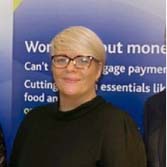

Adults are expected to have effective money management skills. But many countries do not provide sufficient basic financial education at school.
Adults are expected to have effective money management skills. But many countries do not provide sufficient basic financial education at school.
What kind of challenges do adults face in terms of money management and what are the best ways to improve financial skills? Three experts from organisations working against over-indebtedness share their views.
Gwen Harris, Ireland:
“As adults we are expected to have effective money management skills. But where have we learned these skills? While they are essential for effective functioning in modern society, in Ireland they are not taught at school.
It is also widely publicised that many people who experience financial difficulties become isolated due to being ashamed about their situations. Perhaps money management education will be a vehicle to normalising money management and debt discussions, while also providing our citizens with life skills and capabilities.
Money management education is one of the key tasks of the State’s Money Advice and Budgeting Service (MABS). In addition to that, we also offer free, independent, confidential and non-judgmental service to our clients. Most of them are over-indebted, living with low income or low disposable income.
When working with adult learners we must be cognisant of the very sensitive and personal nature of money management.
During my career with MABS, I have been very active in money management education, engaging with community groups, schools and prisons.
The aim is educating people in essential practical budgeting skills and money management so that day-to-day expenses can be met and debts can be repaid. In our approach, money management is seen as a life skill.
Our money management education has its roots in community education and is based on participative or experiential learning. This is most effective in small groups that enable group learning and affirmation.
MABS has evolved very inclusively in money management education, with programmes designed for and with vulnerable and marginalised groups.
When working with adult learners we must be cognisant of the very sensitive and personal nature of the context of money management. It is important to create a safe, trusted and supported learning environment for all learners.
Moving to online delivery has created a new barrier for the more marginalised in society, who are perhaps those in most need of these skills and education support.”
Gwen Harris
- Has held many client advocacy roles in the MABS service including Money Adviser, and is currently Regional Manager for North Dublin MABS.
- Has a long history of volunteering with focus on access to education, in-work poverty, fuel poverty and housing needs.
- Has completed research on fuel poverty and access to basic financial services.

Maija Isaksson, Finland:
“Households are becoming more and more indebted in Finland. Often the reason for becoming over-indebted is a life change, such as the end of a relationship, illness or unemployment. It is easy to get loans so many people are getting them.
This is visible in our work at the Finnish Guarantee Foundation. We offer free financial and debt counselling and we can grant guarantees for restructuring loans of up to €34,000. We have an increasing number of clients and their situations tend to be very complex.
The results of this work are not instant, as to change behaviour is a slow process.
I work in a project that was created to do preventive work through different kinds of campaigns and together with other associations. It is aimed at younger people who are becoming independent (18–25 years old) and at those who plan to retire in the next 5–10 years.
In response to the current situation, one of the objectives of the project is to discuss the attractiveness of loans.
We talk about how loans are being sold to consumers and how marketing is affecting our behaviour, pushing us to take loans that are too large and expensive and to consume more than we need to. The results of this work are not instant, as to change behaviour is a slow process.
Last year we launched a free digital money management course, and it has received positive feedback. We believe that online courses are a good channel for spreading more knowledge regarding money management. You can do them anonymously and at your own pace, which lowers the threshold to participate.
On the other hand, people also feel the need for peer support. We noticed this through our ‘Manage your money’ Facebook group. I created it less than two years ago as part of my work and it now has over 2,000 members.
Our latest model is to take financial advice to workplaces, where we can reach working people of different ages. Not only the workers but also the employers and trade unions have shown interest in this initiative.”
Maija Isaksson
- Has a Master’s degree in theology. Has also studied economics and social work.
- Has worked in two different projects with the Guarantee Foundation and, in both, she has been involved in developing digital services that support households in money management.
- Has worked in a bank and as a social worker.

Pauline Dujardin, France:
“The French public education curriculum does not have any financial education courses. As a result, many people have insufficient knowledge to deal with their own financial situations. Often people seek help only once they have already become over-indebted.
I see this in my work as the legal counsellor for the federation of CRÉSUS associations. CRÉSUS is a network of 30 non-profit associations, and its aim is to provide help to people facing financial difficulties. This help also includes legal and psychological support.
Our care process always begins by establishing a budget in order to grasp the extent of the financial difficulties faced by the beneficiaries. From there we help choose the best remedies available to them.
This can translate into an over-indebtedness procedure initiated with the Banque de France, or into asking a judge to grant a stay of execution with respect to any payments owed to creditors.
In France, too many people rely on credit for their consumer needs.
At times, our role entails giving advice on how to better manage current expenditure.
Our approach is based on a bond of trust between the beneficiary and the CRÉSUS volunteer helping the beneficiary. The key is to listen to the beneficiary with benevolence and without passing judgement.
In France, too many people rely on credit for their consumer needs, even when they do not have the means to repay these loans. Financial education is the only way to prevent these sorts of situations.
CRÉSUS has developed a board game called Dilemme. It is similar to Monopoly and designed to teach participants of all ages how to manage their budget. The original Dilemme education game deals with personal budget management, financial products and fiscal responsibility.
The Dilemme games also include an online version called Dilemme Junior, designed to raise awareness amongst children about the value of money. Dilemme Entrepreneurs aims to inform entrepreneurs of best practices in risk management and of the challenges of entrepreneurship.”
Pauline Dujardin
- Has been working as a legal counsellor for CRÉSUS since 2019.
- Before joining CRÉSUS, she was a lawyer specialised in labour law.
- Studied law in France and Germany.

Author







